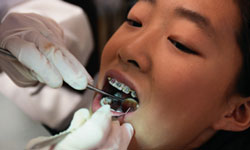
John Schneider, a 31-year-old from Mount Orab, Ohio, spent several months battling an infection. Although family members urged him to go to the doctor, Schneider told them he couldn’t afford the expense. He was convinced it was just a sinus infection, an illness he could handle on his own.
Over time, Schneider’s symptoms became so severe that he was admitted to a hospital. Within a few weeks, his condition worsened and he died. Turns out, Schneider’s self-diagnosed sinus infection was actually an abscessed tooth, an infection at the root of a tooth or between a tooth and the surrounding gum tissue. In Schneider’s case, the untreated abscess caused an infection to spread through his bloodstream and led to widespread organ failure in his body [source: Montoya].
While this may sound like an alarmist tale, Schneider’s isn’t the only recorded case of death from an abscessed tooth. In recent years, a 12-year-old boy died from a brain infection caused by an abscessed tooth. And a 24-year-old man — the nephew of musician Bootsy Collins — died from an abscessed wisdom tooth when the infection caused his brain to swell [sources: Otto, Gann].
A report by the Pew Charitable Trusts revealed that abscessed teeth and other preventable dental woes were the main reason 830,590 people went to emergency rooms in 2009 (the latest year for which data was available). That number increased 16 percent from 2006 [source: Pew Charitable Trusts]. Mouth pain can be pretty severe, but what scenarios result if these patients skip the treatment and just grin and bear it?
An abscessed tooth can lead to potentially lethal complications. Without treatment, the infection could spread throughout the head and neck. For example, your jaw could begin to disintegrate, or you could get an infection in your brain. An abscessed tooth could also cause endocarditis, a bacterial infection that leads to an inflammation of the heart chambers’ and valves’ inner lining. Abscesses have been known to cause sepsis, which is when infection spreads from its point of origin throughout the body. An abscessed tooth also could cause pneumonia or, in rare cases, Ludwig’s angina, an infection under the tongue that causes extreme swelling and difficulty breathing.
Receiving regular dental care is important step in preventing an abscessed tooth. If an abscess does develop, antibiotics can cure it. Sometimes a combination of antibiotics and dental procedures is necessary, such as a root canal that will remove the infected areas beneath the gum line and, potentially, save the abscessed tooth. Until you receive professional treatment, you can manage the pain by rinsing periodically with a homemade solution made from table salt and warm water.





